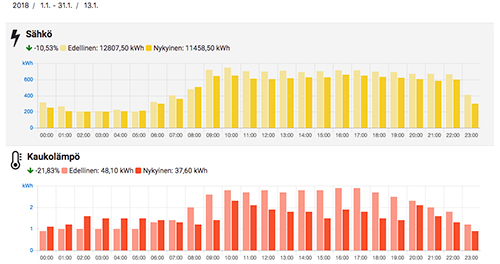How to reduce climate emissions and lower energy costs on properties? One possible answer is provided by energy management and its digitisation. This can, for example, control the energy consumption of supermarket refrigerators.
At its simplest, digitizing energy management means gathering information that is distributed across a variety of automated building and refrigeration systems in one place to be presented in a well-visualized and easy-to-handle format. An expert’s day is no longer spent gathering information but rather analysing it and, above all, taking action on it.
In the pilot project funded by government’s flagship project KIRA-digi Optiwise Oy was piloting digitalisation of energy management in seven commercial properties: three of which were hypermarkets, three supermarkets and one a service station.The main goal was to eliminate most of the manual steps and to allow experts to use their time for actions that directly benefit the customer. In addition the project explored the use of neural networks based artificial intelligence in energy management.
As a result of the project implemented in 2017, the efficiency of energy management improved significantly. As a result the energy costs dropped, user conditions improved, climate emissions decreased, and responsibility of operations increased.
Artificial intelligence detects abnormal temperatures in refrigeration equipment
With the pilot project, a new feature was added to the Optiwise application. Property consumption monitoring covers electricity, heat and water meters and their sub-meters. The visualisation of these readings in the application was developed so that an expert can easily zoom in a view of energy consumption in one property during a single hour from a large mass of was developed so that the application makes it easy for an expert to drill from a large mass of real estate to the consumption of a single property for one hour.
Perhaps the most interesting part of the project was developing a neural networks based artificial intelligence to analyse temperature data to determine whether the refrigeration equipment is working as it should. AI can, among other things, recognise uncommonly high and low temperatures of the equipment and problems with defrosting cycles. It can notify an expert at a refrigeration service company or energy manager who can then identify the cause of the problem and take corrective action.
Significant savings potential in thousands of properties
The main goal of the pilot project was to eliminate most of the manual steps and to allow experts to use their time for actions that directly benefit the customer. This goal was met successfully: the energy consumption of refrigeration in the pilot properties decreased by 15% during the trial period.
These results can be utilised on their own and the measures repeated at the nearly 3,000 markets in Finland. The service also has potential for export. For example, in Sweden, Norway and Denmark the number of potential properties is slightly higher than it is in Finland. The European market is even bigger.
One of the concrete objectives was that instead of controlling some dozens of properties a single expert should be able to control thousands. Since the project has started one expert can now control about 150 properties. The efficiency of an expert will be further enhanced by utilising the data analysis by artificial intelligence.
The insulated character of the industry is holding back development
The biggest challenge in digitalisation of energy management is the antiquity and seclusiveness of the real estate and construction industries. The existing operators in the field strive to protect their own business by controlling data flow and keeping interfaces non-compatible. As a solution to this problem, property owners should, as a single front, require system vendors and service providers to create open interfaces for their applications which would allow other actors to access data belonging to the property owner.
Optiwise Oy



The Ministry of the Environment has granted funding for digitisation of energy management from KIRA-digi, the government’s flagship project involving ministries, municipalities and the KIRA Forum, designed to advance digitalisation of the real estate and construction industries. The goal is an open and interoperable ecosystem of information management for built environment.
The article has been originally published in the blog of Experimental Finland 26.2.2018.
More info: Optiwise Ltd, Juho Jakka 050 535 4208
